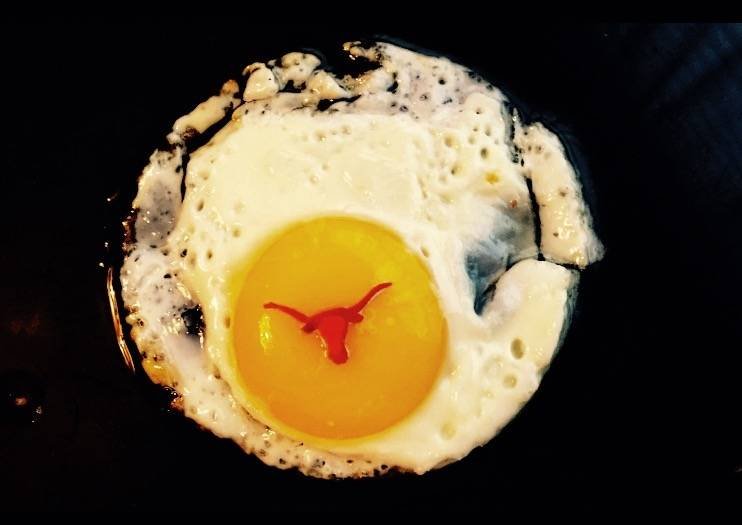Fix the environment not the flower
For many of you, the following article will represent old-school thought. However, Old-school winning recruiting formulas should not be dismissed as old-fashioned. Indeed, recruiting techniques and rules that govern the game have changed dramatically, but the winning principles have not. Team-focused football players who are blessed with innate intangibles have always been winners throughout the history of sports.
Applewhite had an intangible quotient. He was not tall or speedy but had the brains and heart to win. Would he be recruited in 2024 with more intangible qualities than tangible qualities?
In the book “The Road to Texas” by Mike Roach, Rod Babers says “ Chris Simms came in as the top quarterback in the country”…..but Simms “had a penchant for faltering in big moments.” “Applewhite shone when the lights were the brightest”….. “there was no doubt that my man Simms would underachieve.”
Old-school recruiting techniques from 1960 through 1983 celebrated the powerful, intangible inner strength dynamics of young men who dreamed of being great. There is a lot to be said about attitude creating winners. Players who are small and slow but think they are big and fast win games.
Quite frankly, I think Texas would still be a winner if Texas selected players from the inside out instead of the outside in. Unfortunately, that has not been the case for the last 13 years.
Unfortunately, data gathering now selects recruits based primarily on speed, jump, weight, height, and high school stats. Of course, all are vital recruiting factors, but there is more to winning in a team environment than just individual talent.
Just look at the computer data hype surrounding 2023 high school football player Anthony Hill.
““ he is an off-ball linebacker, possessing a desirable frame at 6-2, 225lbs, and dynamic athleticism paired with impressive lateral quickness and plays every snap with a nasty, ultra-aggressive demeanor. Hill can be utilized as a pure run stopper and featured in blitz packages, employing his impressive closing burst. in coverage, he has the potential to cover the middle of the field, has shown side line to side line ability on multiple occasions, and looks to improve in coverage skills during his senior season. Overall, his superior athletic traits place him in the upper echelon of linebacker prospects for the 2023 class.” ”
All this information is important, but nothing is mentioned about his intangible quotient. This is something that Texas coaches intuitively understood and recruited in the past.
Royal and Bear Bryant Recruits
In many ways, Bear Bryant and Darrell Royal were coaching soulmates, with Royal helping Bear keep his offenses relevant. When Royal was at Mississippi State, Bryant visited him to learn the nuances of the split T offense. In 1970 Royal taught Bryant the nuances of the wishbone. According to Bryant, the lesson learned about the wishbone helped save his job at Alabama.
Royal and Bryant had other similarities. Royal gravitated to recruits with dreams of greatness, aggressive traits, and instincts to hit. He liked recruits with Billygoat instincts that could inspire teammates. Royal picked high school athletes who chose not to run out of bounds but stuck their cleats in the turf and pointed a face mask straight upfield. He wanted self-starters saying if you "spend time waiting for these promising boys to deliver, pretty soon you're wearing a straw hat to Christmas."
Royal and Bryant were masters at selecting recruits who were small and slow but who thought they were big and fast. A quality missing from Texas football recruiting since 2009.
Bear Bryant also recruited like Royal. In the Junction Boys by Jim Dent, Coach Bryant says he doesn't mind if a player is a little short in talent or stature if he can compensate for it with a big heart. Bryant said, "I can reach a kid who doesn't have any abilities as long as he doesn't know it." Bryant also believed that "What matters.... is not the size of the dog in the fight, but the size of the fight in the dog." "Life's battles don't always go to the stronger or faster. But sooner or later, the man who wins is the one who thinks he can."
Many players like this played under Royal and Akers but would never receive a scholarship in the computer database NIL world surrounding the 21st century. Intangibles is not a word that a computer understands.
To read about some of these players Bear Bryant and Royal recruited, visit the link DKR-THE BRIDGE BUILDER FOOTBALL (squarespace.com)
A motto like the one in 2022, "all gas and no brakes," galvanized and then embarrassed the Longhorn base when the saying reflected the slogan "No gas and all brakes." But, of course, Motto doesn't win or lose games; players do.
In many ways, the 2021 football season mirrored the 1956 1- 9 season. Both were low points in the history of Longhorn football. For the last 12 years, I have heard empty promises from computer rankings and fans. An empty refrain that has reverberated off the halls of the Longhorn nation for too many years with little winning tradition in sight.
Consequently, it is difficult to believe all the hype surrounding the 2022 football season. So here is what needs to be done to return Texas to a winning tradition.
Mack Brown, in his last three years, Coach Strong, Coach Herman, and even Coach Sark in his first year failed to change the environment so the Longhorn burnt orange football flower could bloom.
In particular, the 2021 team reflects a decade's decline in the intangibles needed to win games.
There is no question that 2021 was a bloom buster- an environmental disaster of epic proportions.
Hopefully, the Athletic Department will fix this ecological problem, and the burnt orange rose can strike a victory pose in 2022.
Royal, Akers, and Brown understood that intangibles won games. Team Chemistry, team bond, hard work, One team heartbeat, a fighting spirit, grit, backbone, and moxie, along with other intangibles, were missing from the 2021 team.
Women's basketball Coach Page said that winning traditions are "built around intangibles ."It's Character And Pride................... It's The Things That Keeps People Performing When They're Tired.... It Can Be As Important As Money In Building A Program."
Coach Akers says about intangibles, "whatever it is that makes you feel bigger than you are and faster than you are," is the cornerstone for a winning tradition.
For Royal fixing the losing environment he inherited in 1957 required testing each player's character to the very core. He chose brutal Spring practice to determine the intangible quotient of his players. Royal wanted to expose the quitters during spring training instead of during an important game.
Mack Brown understood that intangibles strengthen the one heartbeat of a team.
Coach Snyder's Kansas State football teams were the model for winning with excellent coaching and intangibles. Many of his teams were composed of 2 and 3- star athletes who beat favored blue-chip teams with a spirit and drive not measurable by a computer.
JUDGING INTANGIBLES IS WHERE COACHES MAKE THE MOST RECRUITING MISTAKES
THE GOOD EGG.
Judging an athlete's intangible quotient is where coaches make the most recruiting mistakes. Recruiting Student-Athletes primarily using Research Laden data-driven Dossiers have led to many recruiting errors. Coaches spend too much time quantifying instead of qualifying recruits. They miss the good egg by judging talent with only empirical data.
Coach Lemons says that intangibles are how the prospect handles himself- charisma, mannerisms, excitement level, and how he shoots the ball. Abe Lemons noted that farmers could hold up an egg to the light and see if it is a good egg. Unfortunately, recruits cannot be handled that way "to see what is inside 'em." Abe Lemon once said, "doctors bury their mistakes, but mine are still on scholarship."
Coach Lemon conceded that "it's the worst part of coaching." The annual search for high school talent is pressured-packed. Recruiters can't read the player's mindset, so they make decisions primarily based on past performance, agility, and quickness.
However, the measure of an athlete is more than just star ranking. There are talented athletes with bad intangibles, and average athletes with great tangibles. While talent is essential in winning, it is not the primary reason teams have a winning tradition. Selecting players with good intangibles wins games.
Coach Aker said, "Whatever makes you feel bigger than you are and faster Than You Are" are intangibles that win games.
Bad recruiting intangibles include:
successful athletes who do not work hard to improve in high school and then continue that mindset in college,
Other athletes have a great attitude but play poorly in pressured games,
Some athletes lose interest in sports for many reasons: homesickness, a missed girlfriend, or sports burn-out. In 1978 Coach Akers signed a great athlete, but he packed up his car and went home before he took a snap in a game. His heart was not in football.
Some leave for timing issues. Mike Presley was a great athlete, but he had to compete against All-American Marty Akins. Mike never got the starting job, so he left the Longhorn program his senior year. While Priest Holmes did graduate from Texas, he was in the same position as Mike Presley. Priest Holmes was Heisman trophy winner Ricky Williams's backup.
However, the primary intangible that recruiters cannot judge is a player's ability to adjust from home to college life. Unfortunately, many athletes cannot adapt to all the freedoms and responsibilities of college. Immaturity, poor role models, bad study habits, lack of discipline, little foresight, inspirational and motivational deficiencies, and alcohol abuse result in a loss of free education.
Intangibles define the "good egg" and are vital to winning. DKR, Akers, and Brown were successful good egg hunters. These coaches made the Longhorn iconic helmet the national symbol of winning the "Longhorn way."
However, the primary intangible that recruiters cannot judge is a player's ability to adjust from home to college life. Unfortunately, many athletes cannot adapt to all the freedoms and responsibilities of college. Immaturity, poor role models, bad study habits, lack of discipline, little foresight, inspirational and motivational deficiencies, and alcohol abuse result in a loss of free education.
Intangibles define the "good egg" and are vital to winning. DKR, Akers, and Brown were successful good egg hunters. These coaches made the Longhorn iconic helmet the national symbol of winning the "Longhorn way." Let’s hope that Coach Sark is a good egg hunter.






